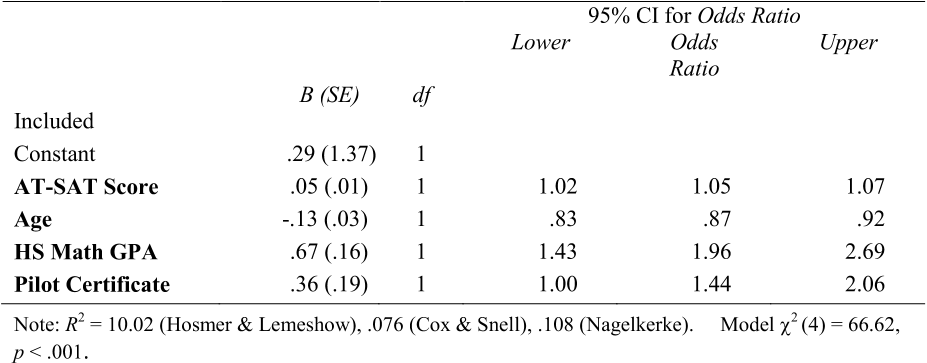
Using Biodata to Select
Air Traffic Controllers
Linda G. Pierce
Dana Broach
Cristina L. Byrne
M. Kathryn Bleckley
Civil Aerospace Medical Institute
Federal Aviation Administration
Oklahoma City, OK 73125
October 2014
Final Report
DOT/FAA/AM-14/8
Ofce of Aerospace Medicine
Washington, DC 20591
Federal Aviation
Administration

NOTICE
This document is disseminated under the sponsorship
of the U.S. Department of Transportation in the interest
of information exchange. The United States Government
assumes no liability for the contents thereof.
___________
This publication and all Office of Aerospace Medicine
technical reports are available in full-text from the
Federal Aviation Administration website.

i
Technical Report Documentation Page
1. Report No.
2. Government Accession No.
3. Recipient's Catalog No.
DOT/FAA/AM-14/8
4. Title and Subtitle
5. Report Date
Using Biodata to Select Air Traffic Controllers
October 2014
6. Performing Organization Code
7. Author(s)
8. Performing Organization Report No.
Pierce LG, Broach D, Byrne C, Bleckley MK
9. Performing Organization Name and Address
10. Work Unit No. (TRAIS)
FAA Civil Aerospace Medical Institute
P.O. Box 25082
Oklahoma City, OK 73125
11. Contract or Grant No.
12. Sponsoring Agency name and Address
13. Type of Report and Period Covered
Office of Aerospace Medicine
Federal Aviation Administration
800 Independence Ave., S.W.
Washington, DC 20591
14. Sponsoring Agency Code
15. Supplemental Notes
Work was accomplished under approved task AM-B-11-HRR-523
16. Abstract
We examined biographical data (biodata) as predictors of training status (successful or unsuccessful) for
candidate air traffic control specialists (ATCSs): self-reported high school grade point average (GPA), high
school GPA in mathematics, highest educational degree achieved, completing an aviation program from a
school in the FAA’s collegiate training initiative program, and holding any pilot certificate. These factors
have been shown to predict controller training success in previous research or are being considered for use
as quality rating factors in controller selection.
Method. We computed separate logistic regression equations for en route and terminal trainees. Score on
the Air Traffic-Selection and Training (AT-SAT) test battery and age at entry on duty was entered first and
second into the equations. Finally, we entered the biodata items using a forward stepwise selection method.
Success in training, first at the FAA Academy and subsequently at the trainee’s first facility, was the
criterion measure.
Results. Results were only partially supported by previous research. As expected, AT-SAT score was a
significant predictor of training success in both regression models. Trainees with higher AT-SAT scores
were more likely to complete training successfully than trainees with lower AT-SAT scores. Also, and as
expected, age was inversely related to training success in both models. Younger trainees were more likely to
complete training successfully than older trainees were. En route trainees with a self-reported high school
math GPA of A and those with any type of pilot certificate were more likely to succeed in training than
trainees with a high school math GPA less than an A and/or without any type of pilot certificate. For
terminal trainees, no biodata items added to AT-SAT score and age in predicting training success.
Discussion. Based on an analysis of the relationship between selected biodata items and training success,
we conclude that the evidence for using these biodata items for controller selection is weak. We recommend
that if biodata are used to select ATCSs, additional research is needed to identify and validate items
predictive of success in training. We also recommend that a criterion measure representative of job
performance of air traffic controllers be developed and validated for use in future research on the selection
of air traffic controllers.
17. Key Words
18. Distribution Statement
ATCS Selection, Air Traffic Control, Biodata,
Biographical Data
Document is available to the public
through the Internet:
www.faa.gov/go/oamtechreports
19. Security Classif. (of this report)
20. Security Classif. (of this page)
21. No. of Pages
22. Price
Unclassified
Unclassified
13
Form DOT F 1700.7 (8-72) Reproduction of completed page authorized


iii
ACKNOWLEDGMENTS
Research reported in this paper was conducted under the Air Trac Program Directive/Level of Eort Agreement
between the Human Factors Division (ANG-C1), FAA Headquarters, and the Aerospace Human Factors Research Division
(AAM-500) of the Civil Aerospace Medical Institute.
e opinions expressed are those of the authors alone, and do not necessarily reect those of the Federal Aviation
Administration, the Department of Transportation, or federal government of the United States.
Address correspondence concerning this report to Linda Pierce, Aerospace Human Factors Research Division (AAM-
500), P.O. Box 25082, Oklahoma City, OK 73125. Email: linda.pierce@faa.gov.





